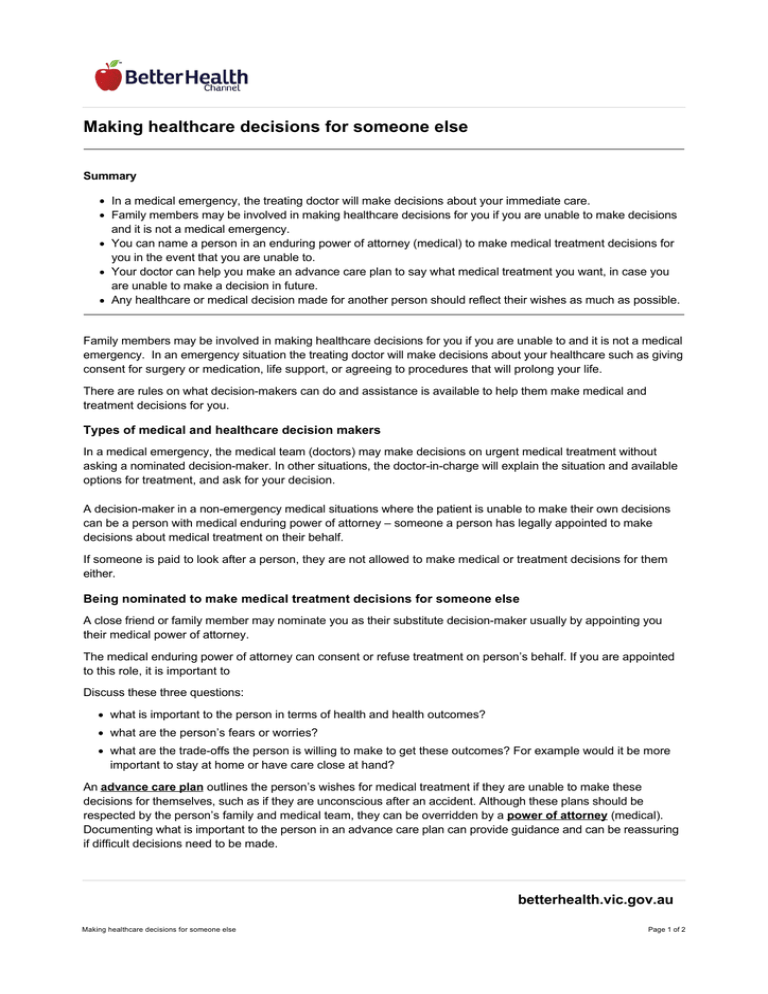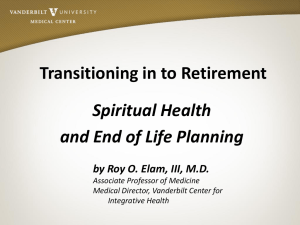Making healthcare decisions for someone else
advertisement

Making healthcare decisions for someone else Summary In a medical emergency, the treating doctor will make decisions about your immediate care. Family members may be involved in making healthcare decisions for you if you are unable to make decisions and it is not a medical emergency. You can name a person in an enduring power of attorney (medical) to make medical treatment decisions for you in the event that you are unable to. Your doctor can help you make an advance care plan to say what medical treatment you want, in case you are unable to make a decision in future. Any healthcare or medical decision made for another person should reflect their wishes as much as possible. Family members may be involved in making healthcare decisions for you if you are unable to and it is not a medical emergency. In an emergency situation the treating doctor will make decisions about your healthcare such as giving consent for surgery or medication, life support, or agreeing to procedures that will prolong your life. There are rules on what decision-makers can do and assistance is available to help them make medical and treatment decisions for you. Types of medical and healthcare decision makers In a medical emergency, the medical team (doctors) may make decisions on urgent medical treatment without asking a nominated decision-maker. In other situations, the doctor-in-charge will explain the situation and available options for treatment, and ask for your decision. A decision-maker in a non-emergency medical situations where the patient is unable to make their own decisions can be a person with medical enduring power of attorney – someone a person has legally appointed to make decisions about medical treatment on their behalf. If someone is paid to look after a person, they are not allowed to make medical or treatment decisions for them either. Being nominated to make medical treatment decisions for someone else A close friend or family member may nominate you as their substitute decision-maker usually by appointing you their medical power of attorney. The medical enduring power of attorney can consent or refuse treatment on person’s behalf. If you are appointed to this role, it is important to Discuss these three questions: what is important to the person in terms of health and health outcomes? what are the person’s fears or worries? what are the trade-offs the person is willing to make to get these outcomes? For example would it be more important to stay at home or have care close at hand? An advance care plan outlines the person’s wishes for medical treatment if they are unable to make these decisions for themselves, such as if they are unconscious after an accident. Although these plans should be respected by the person’s family and medical team, they can be overridden by a power of attorney (medical). Documenting what is important to the person in an advance care plan can provide guidance and can be reassuring if difficult decisions need to be made. betterhealth.vic.gov.au Making healthcare decisions for someone else Page 1 of 2 As the appointed decision-maker, you can override family decisions on medical treatment. Family members can, however, appeal to the Victorian Civil and Administrative Tribunal if they think you are not acting in the person’s best interests. When there is no nominated decision-maker If there is no formal plan, any decision you make for another should be one the person would make for themselves. As far as possible, make a decision about what they would want based on previous conversations you have shared. This is why it is important to discuss a person’s medical wishes with them, so you can understand their views. If you do not know the person’s views or they have been unable to communicate them, make a decision based on the medical team’s advice and considering which medical treatment option will help them best in the short and long term. Where to get help Your doctor Lawyer Victoria Legal Aid This page has been produced in consultation with and approved by: Department of Health and Human Services Content on this website is provided for education and information purposes only. Information about a therapy, service, product or treatment does not imply endorsement and is not intended to replace advice from your doctor or other registered health professional. Content has been prepared for Victorian residents and wider Australian audiences, and was accurate at the time of publication. Readers should note that, over time, currency and completeness of the information may change. All users are urged to always seek advice from a registered health care professional for diagnosis and answers to their medical questions. For the latest updates and more information, visit www.betterhealth.vic.gov.au Copyight © 1999/2016 State of Victoria. Reproduced from the Better Health Channel (www.betterhealth.vic.gov.au) at no cost with permission of the Victorian Minister for Health. Unauthorised reproduction and other uses comprised in the copyright are prohibited without permission. betterhealth.vic.gov.au Making healthcare decisions for someone else Page 2 of 2




